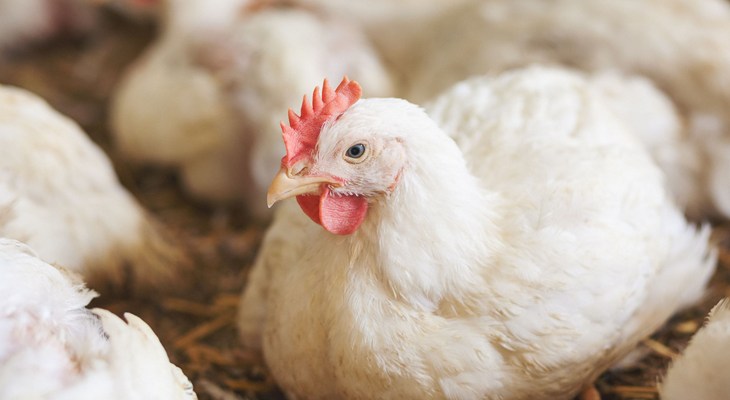Creating positive change for chickens!
In recent years, driven by consumer demand, investor considerations and market forces, there has been a number of higher welfare pledges for broiler chickens from global leaders across all food sectors.
More than 1 billion broilers are set to positively benefit from these corporate pledges.

What is wrong with modern broiler chicken production? Find out more.
The European/Better Chicken Commitment
In September 2017, Compassion joined forces with a group of European NGOs asking the food industry to commit to new welfare standards for broiler chickens.
The European Chicken Commitment, also known as the Better Chicken Commitment, is a pledge committing its signatories to introduce higher welfare standards for all the chickens in their supply by 2026, including:
- Moving to slower growing breeds for improved health and welfare
- More space to live
- Natural light, perches and pecking substrates so chickens can express natural behaviours
- A more humane slaughter
- Compliance with a meaningful third-party animal welfare certification and annual reporting
Higher welfare requires a holistic approach that encompasses all the most pressing welfare concerns for broiler chickens, as outlined in the Better Chicken Commitment. It is a package of science-based criteria, and ALL the criteria need to be implemented to significantly improve the lives of chickens reared for meat. One of the most important requirements is moving to slower growing breeds that have been shown to have better welfare outcomes and lead healthier, happier lives. Read more in our latest blog.
In Europe, over 380 companies have signed up for better chicken, including key brands like KFC, M&S, Unilever, Nestlé, Waitrose, Danone, Elior Group, Sodexo, and 99% of the French retail market.
In the US, over 230 companies have agreed a similar ask to provide better welfare for broilers by 2024.
Compassion has worked closely with many of these food businesses.
Find out who has signed up for Better Chicken here.
Compassion helps drive change
Compassion works closely with its corporate partners to secure Better Chicken Commitments and helps them on their higher welfare journey by:
- Working with companies to develop their roadmap for implementation, in particular making the business case; mapping the supply; finding solutions to barriers; marketing and consumer communications
- Hosting industry fora where stakeholders across the supply share experiences on transition to the BCC, update on the latest information, and brainstorm next steps for progressing delivery
- Participating in industry Working Groups on key topics to help resolve barriers to progress, such as: visual identity and consumer marketing; alternative breed availability; business to business connections; effective electric stunning without live inversion
- Engaging with Assurance Schemes to encourage them to set standards and audit to the Better Chicken Commitment
Find out more about higher welfare broiler production here.
Broiler Case studies
Read our latest case study on how Norwegian retailer REMA 1000 Norge AS worked with its poultry producer Norsk Kylling to successfully implement the higher welfare requirements of the Better Chicken Commitment.
Learn more about how M&S, the first UK retailer to sign up to the Better Chicken Commitment, successfully transitioned so that ALL its fresh chicken now complies with the BCC requirements.
Also, watch the latest video of the Windstreek System that has been developed in The Netherlands which is a new, modern design of broiler shed, incorporating multiple features for improved welfare and sustainability. (You can also read a more detailed case study on this system.)
Join the broiler revolution!

Working together we can investigate supply chain solutions and stimulate the market for higher welfare chicken.
Find out more about our Good Chicken Award.
Read the European Chicken Commitment overview.


